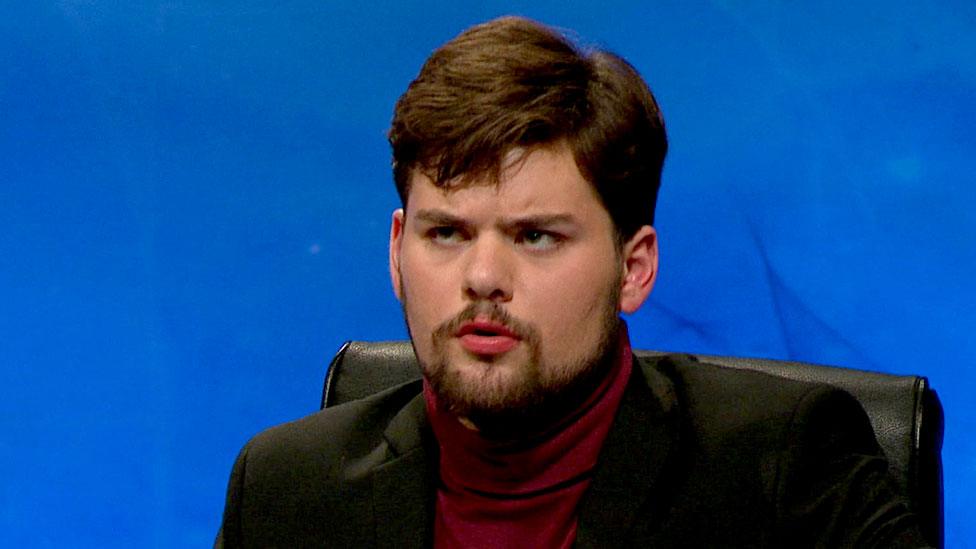University Challenge: Durham students reach final
- Published
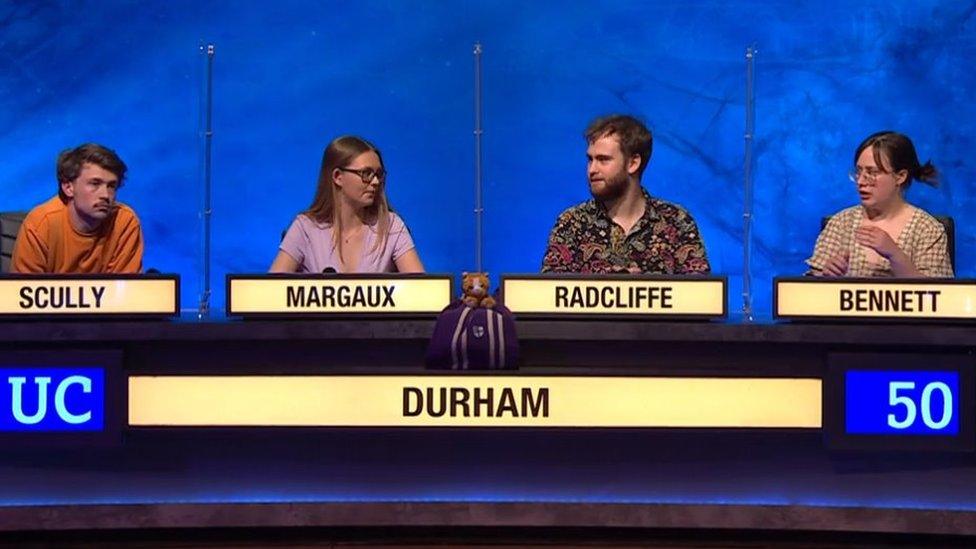
Durham University will take on Bristol in the 52nd University Challenge final on Monday
A team of Durham University students have reached the final of University Challenge for the first time since 2000 (when Durham last won the contest). The BBC spoke to members of the team to find out what it's like taking part in one of TV's toughest quizzes.
"It's kind of insane," says Bea Bennett, an English student from Icomb in Gloucestershire.
"You tend to press the buzzer before you actually know the answer," she says, adding: "You've got that very short amount of time when they say 'Durham Bennett' for you to try and remember the answer and say it out loud.
"You see that massive camera swing towards you and that's the terrifying bit."
Bea is the keeper of the team's mascot, a toy cat named Badger after Durham Cathedral's moggy, who has seen the team achieve an average score of 170 points across their six matches leading up to Monday's final.
The "only blot on Durham's copybook", as host Jeremy Paxman called it, was a quarter-final loss to Royal Holloway.

What is University Challenge?
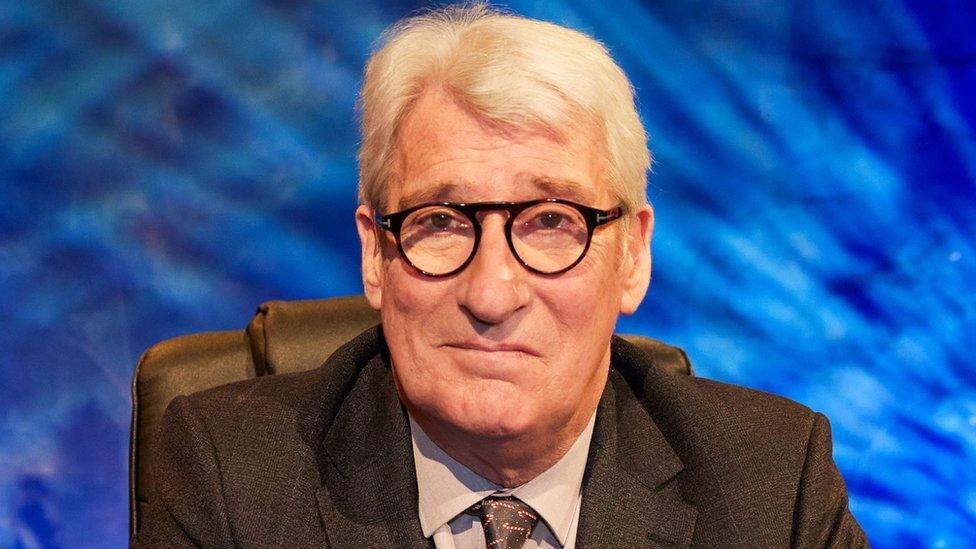
Jeremy Paxman has hosted University Challenge since 1994
As Paxman often tells contestants, you should know the rules by now.
But just in case you don't, each week two teams of four students from UK universities tackle questions on an array of subjects with winners progressing through a series of rounds (losers can also get through depending on which round it is or how high their score is but let's not get too complicated).
Players buzz in for the starter for 10 question (worth 10 points) but be warned, if you interrupt before Paxman has finished asking the question and get it wrong your team loses five points (and worse, often suffer a sneer of derision from the veteran broadcaster).
Whichever team answered the starter correctly then gets asked three questions, each worth five points, on a particular, sometimes impenetrable, topic, but if they take too long they will be told to "hurry up" or "come on" by a pressuring Paxman.
Paxman has been the question-master since the series was relaunched in 1994 (having been previously presented by Bamber Gascoigne from 1962 to 1987), but the journalist has announced this will be his last series, with Amol Rajan named as his replacement.
The final will be shown at 20:30 BST on Monday on BBC Two and on the BBC iPlayer.

Durham, with an average age of 21, take on Bristol University in the final, a rematch of the very first contest of the series which Durham narrowly won 195 to 185.
Alex Radcliffe, a maths student from Edinburgh who was selected to be captain by a coin toss, won that tie with the final question of the game after Durham drew level thanks to their knowledge of Norwegian cities.
The winning question was: In mathematics, what two-word term, where each word contains all five vowels, is used for the calculation of a set of variables satisfied by the same values?
The answer can be found at the bottom of this article.
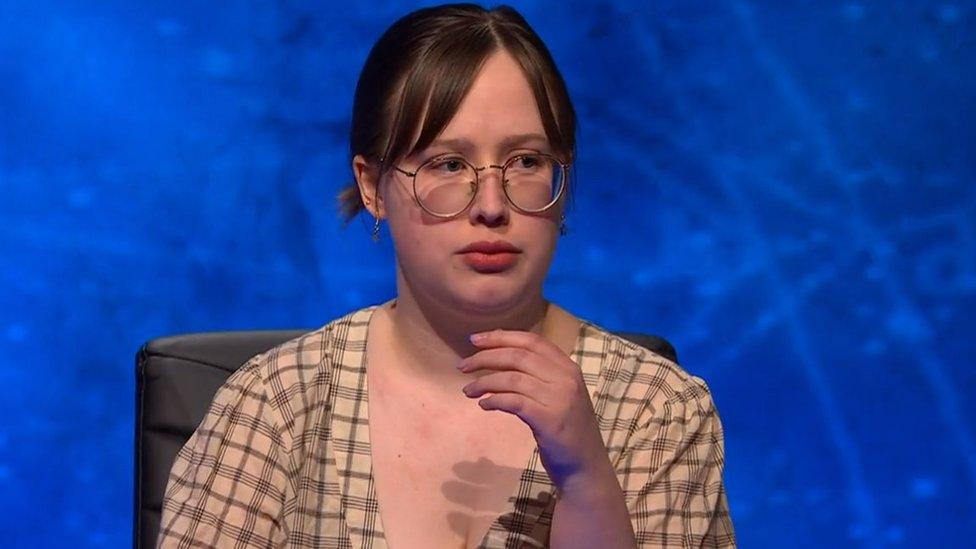
Bea Bennett is studying English at Durham University
Just getting picked for Durham's team was a gruelling process according to Harry Scully, a physics and chemistry student from Welwyn Garden City in Hertfordshire.
Having answered an advert on Facebook, they had to take and pass tests to make it to their own college's team who then competed against each other.
"There were three or four rounds of selection quizzes," Harry told BBC Radio Newcastle, adding: "[Contestants were] narrowed down from 100 people to 50 to 10.
"The four of us then got picked and I'm very glad we were."
Despite being knocked out of the college competition in the first round, sociology student Chloe Margaux from Harringay in north London made the cut as she was one of the highest individual scorers.
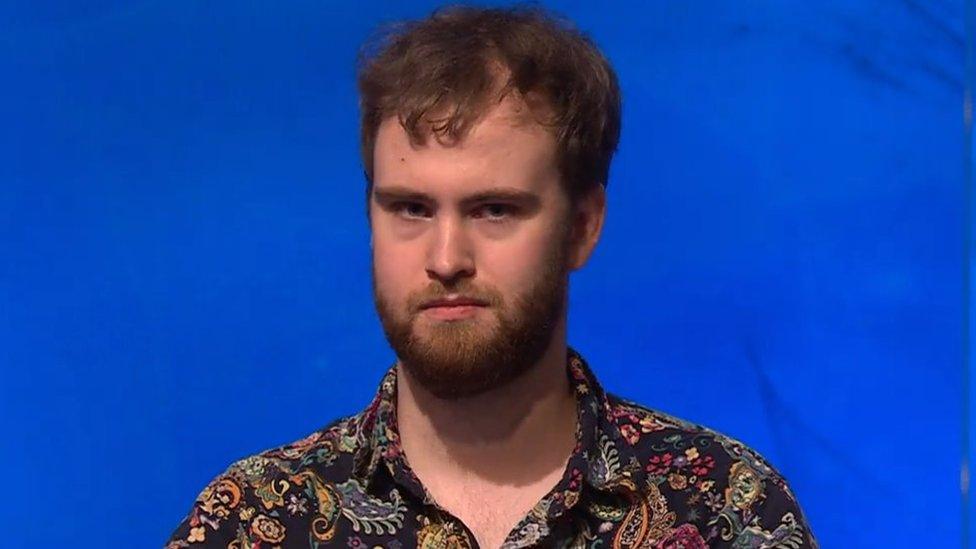
Durham's captain Alex Radcliffe has impressed with both his knowledge and snazzy shirts
The new super team spent an intense two months watching old episodes and studying books of past questions.
They worked out who knew what about what and where there were gaps in their knowledge, then spent time filling those in.
"We were getting our heads into the style of questions they ask and being able to make split second decisions on whether to buzz early," Bea says, adding: "Half the points can be won or lost by buzzing in the quickest."
Harry created flash cards to counter the team's weakness on anatomy and Bea procured a deck of playing cards featuring the UK's Prime Ministers.
The show, now in its 52nd series, was recorded in Salford and Chloe says despite the tension in the studio it was a fun experience.
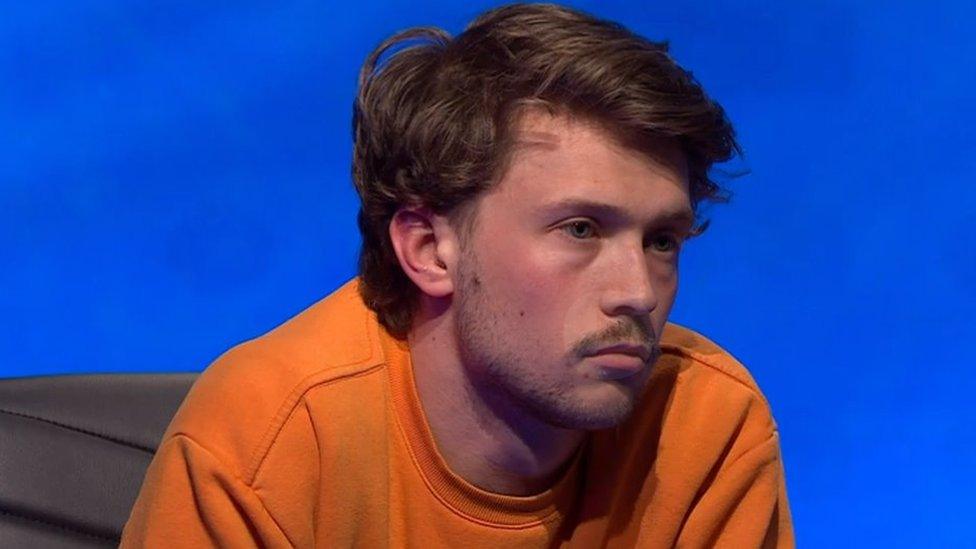
Harry Scully said a lot of students wanted to be part of Durham's team
"It was really like a friendship holiday with some quizzing on the side," she says.
Meeting Paxman was also a highlight, Bea says, calling him "very generous and encouraging".
"If he said 'well done' when you got a question right then you knew you had given a good answer."
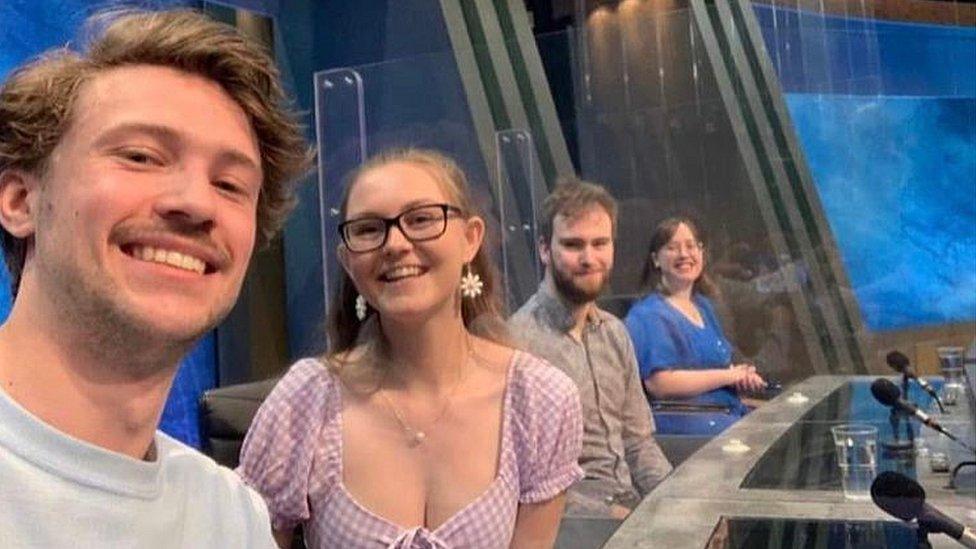
The four made multiple trips to Salford for the various tapings
Bea says she was nervous before each bout but, fuelled by ginger juice from a nearby coffee bar, she and her teammates would fall into the "zone" as soon as the theme music played out.
"You lose all concept of time," Bea says, adding: "You just become totally present in the moment."
Each player has their speciality subjects and they instinctively know when to leave an answer for their teammates to chime in.
Similarly, they know when they hear certain "buzz words" this could be one in their wheelhouse and the expectation will be on them, Bea says.
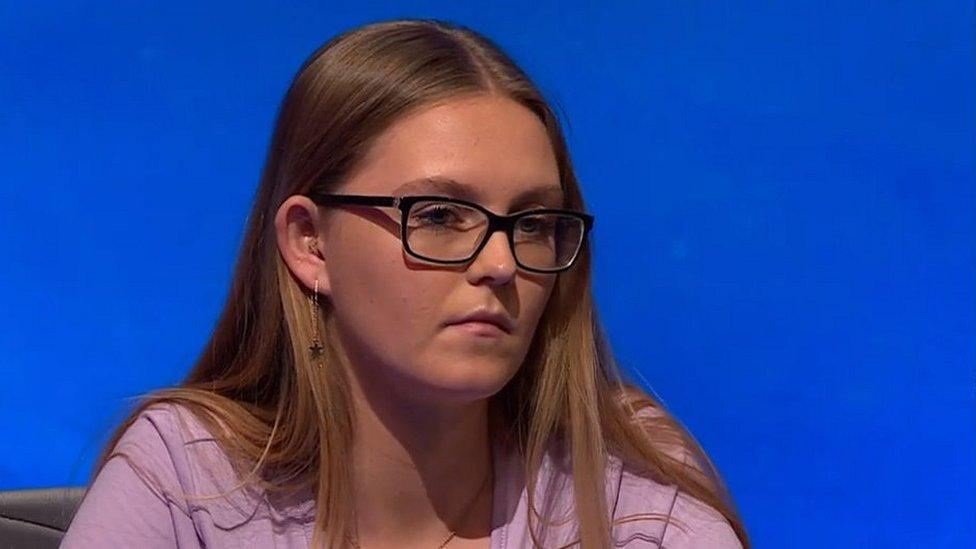
Chloe Margaux said the team had become firm friends
They will watch the final in their respective college bars - Harry, Alex and Bea at Hild Bede and Chloe at Josephine Butler - which is good as regardless of when the rest of the world learns of the result "we will be in a bar", Bea says.
She says it has been difficult to keep the final scores secret but people have respected it can't be divulged.
The four team members and their reserve Tom Haines-Matos have proved their knowledge on a vast array of subjects, and Chloe admits they have come together to win a "couple of pub quizzes" and monetary prizes.
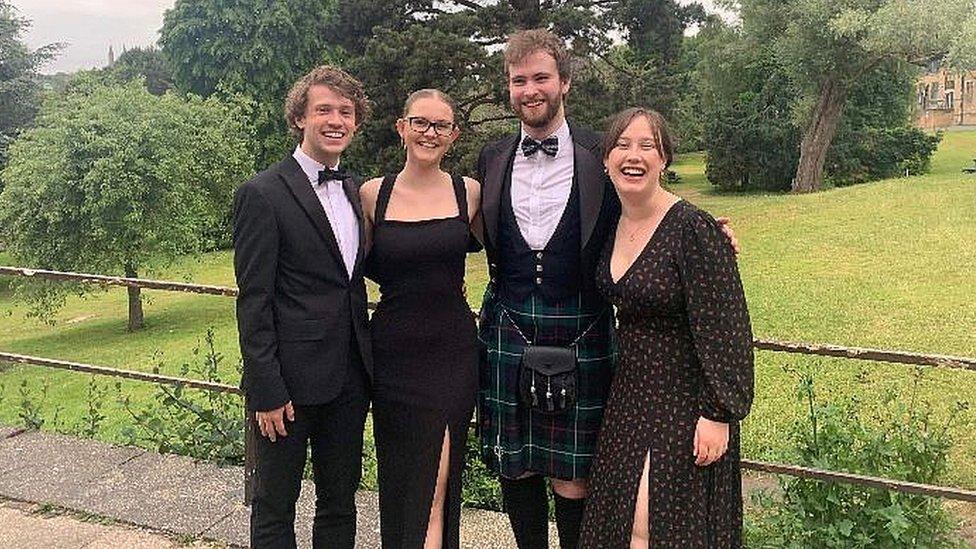
The four students have become firm friends
"I feel we are not going to be allowed to do that now people know we are a team," she says with a laugh, adding: "Because we are benefitting financially."
Their quizzing has also gone down well with their friends.
"We've become very popular," Chloe says, adding: "We get invited to a lot of pub quizzes.
"But there's also a lot of pressure on us because they expect us to know every answer.
"We are not all good at everything."
The answer Alex got right was simultaneous equations.

Follow BBC North East & Cumbria on Twitter, external, Facebook, external and Instagram, external. Send your story ideas to northeastandcumbria@bbc.co.uk, external.
- Published16 August 2022
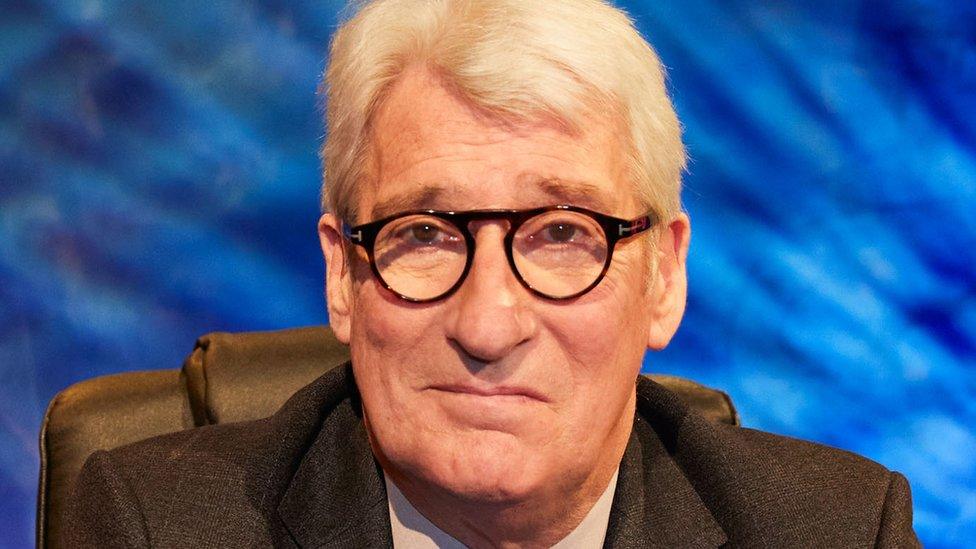
- Published18 August 2022
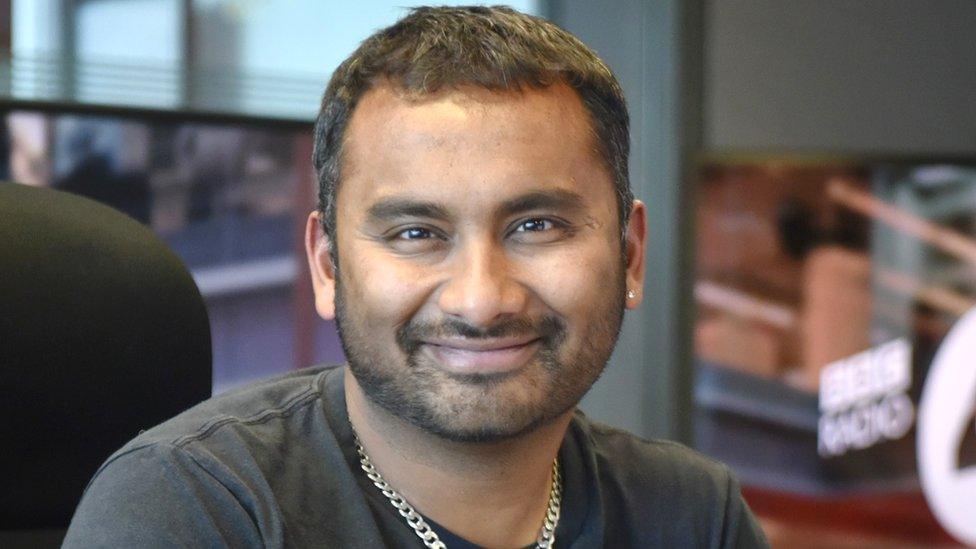
- Published22 February 2019
